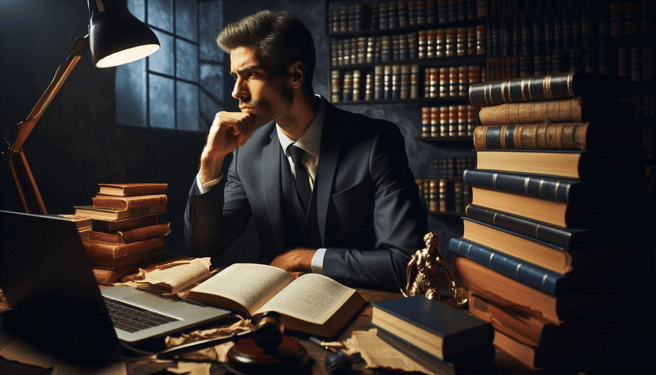The Ethical Dilemma of Defending the Guilty
Aryan Harshraj
Jiwaji University, Gwalior
This blog is written by Aryan Harshraj, a Fifth-Year law student of Jiwaji University, Gwalior


Introduction
The advocates face a profound ethical challenge when it comes to defending guilty clients or accused seemingly guilty of heinous crimes. As highlighted in this blog, the attorney must set aside their own emotions and ensure the guilty accused should receive a fair trial. These principles ensure that no accused is deprived of their freedom without guilt being proven beyond a reasonable doubt. As seen in the high-profile case of the RG Kar rape-murder trial, advocates often bear the brunt of social protest, yet their work is crucial for justice for all.
“No matter how guilty they seem, they deserve a defense, and the lawyer’s role is to ensure that the state cannot take away the accused's liberty without proving guilt beyond a reasonable doubt.” quoted by Alan Morton Dershowitz, American Criminal Lawyer.
In society, the guaranteed protection by our constitution or statutes is not entitled to a class of people. We believe that whether the medical trial or citizen’s perspective of a defendant is guilty or a monster is immaterial. I feel nauseated by the heinous crimes and feel about the situation of the victim and the family, but that should not be a dilemma for an advocate to defend his or her client. That to me is horrifying and constitutes a far more real problem. The advocate’s ethics teach him to represent his or her client for Justice and let the court decide guilty. A lawyer's job remains the same even if he/ she knows the answer.[1].
Not all criminal offenses are committed spitefully, and not all guilty accused are morally tortured. It is imperative to adhere to this crucial ethical guideline consistently, and it is not misleading to the court for an accused to plead ‘not guilty’ when they know that they are guilty because they have the right to trial and put the prosecution to proof.
The one main tenet of the legal system is the Presumption of innocence.[2] This concept, which states that every accused is deemed to be innocent until proven guilty beyond a reasonable doubt in a court, binds defense lawyers. Defense lawyers are expected to keep any correspondence with their clients strictly private. The protection of the attorney-client privilege allows clients to communicate honestly.
In the context of the right of an accused to legal aid, the court held that “An eligible person is entitled to legal services at any stage of proceedings, whether he or she is prosecuting or defending,” in Rajoo @ Ramakant vs. the State of M.P.[3] On 9 August 2012. People who have never faced being criminally accused or threatened with losing their freedom are unable to comprehend the extent to which their rights are deprived.
Lots of shock jocks and hard-line conservatives criticize lawyers for running trials in circumstances where the media trial considers the person to already be guilty. Kavita Sarkar, a Kolkata-based lawyer, is defending Sanjay Roy, the accused of the high-profile RG Kar rape-murder case appointed by the Sealdah High Court, as no other lawyer was willing to take it and the massive protests made several lawyers refuse to take the case up.[4]
“Like everyone, I, too, want justice for victims. But justice, to me, is only served after a court trial, not before. Everyone in this country has a free trial, including the accused.” Kavita Sarkar told the Times of India.
Kavita has also paid bail bonds for people who could not afford them. “I must do my job, which is to defend the accused in criminal cases who do not have a lawyer. In the past, too, I have had to pay bail bonds from my salary.”[5]
The court has asked me to represent the accused. That I will do,” she added.
Even a Pakistani terrorist Ajmal Kasab of the Mumbai 26/11 terror attack, caught on camera spraying bullets, was represented in court for a fair trial.
Concluding remark
Defending the guilty is not just an ethical dilemma but a test of the legal system’s commitment to fairness and justice. The role of defense attorneys is pivotal in ensuring that all individuals, regardless of the public’s perception of their guilt, are given their constitutional right to a defense and a fair trial. This obligation protects the integrity of the legal system and prevents the rush to judgment based on emotions or societal pressure. Ultimately, the role of the lawyer is not to determine guilt but to ensure that justice is achieved in the court of law, reinforcing the principle that everyone deserves a fair trial before any conclusion of guil
References
[1] https://www.quora.com/How-do-defence-attorneys-deal-with-the-moral-dilemma-of-representing-a-client-which-they-believe-to-be-guilty
[2] https://www.mailletcriminallaw.com/blog/defending-the-accused-the-ethics-and-responsibilities-of-defense-lawyers/
[3] https://indiankanoon.org/doc/191628518/
[4] https://timesofindia.indiatimes.com/city/kolkata/kolkata-rg-kar-rape-murder-case-who-is-kabita-sarkar-the-lawyer-who-will-defend-accused-sanjay-roy/articleshow/112726064.cms
[5] https://www.indiatoday.in/india/story/kolkata-rape-murder-lawyer-defending-rg-kar-rape-accused-sanjay-roy-kavita-sarkar-salsa-legal-aid-2589260-2024-08-28
